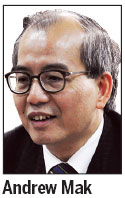Time for Hong Kong to regulate predatory vulture funds
Updated: 2013-11-19 06:48
By Andrew Mak(HK Edition)
|
|||||||||
The fact that hedge funds need to be regulated is an assumed good practice in recent years. One particular predatory type of hedge fund that may need special attention is the so-called vulture fund.
A vulture fund generally refers to a category of hedge fund which invests in debt or high-risk bonds in imminent default. Investors in such funds may profit by buying debt at a discounted price on a secondary market and then claims against the debtor for a greater amount over the purchasing price.
This strategy is particularly popular for sovereign debts. The stress on any international legal center is that the strategy may result in endless litigation. For this reason, the term "vulture" has been used to criticize that kind of fund for strategically profiting off of debtors that are in financial distress. In the US, it has been criticized in some quarters (such as the National Catholic Reporter) that they are morally sickening because it literally takes money out of the budgets of the poorest countries and hands it to "rich fat cats" who did not earn it or work for it, but only manipulated the lack of international legal mechanisms to exploit these poor, desperate countries.
It may be suggested that the sovereign debt instruments that vulture funds buy are open to investment by the public. Nations should have no choice on who invests. It may even be suggested that irresponsible lending and borrowing is a major reason for the eruption of financial and debt crises in many countries. The excessive debt service obligations will then seriously threaten the ability of the governments - in particular the developing countries - to invest in essential public services which are critical for the improvement in a wide range of basic social and economic rights, such as the rights to health, education, work and social security. High debt levels also undermine the achievement of internationally agreed development goals.

It's true that the lack of internationally agreed standards guiding sovereign lending and borrowing may have contributed to many examples of less than responsible sovereign lending and borrowing. As a result, the citizens of borrowing countries continue to pay a high price for irresponsible financing decisions, as their money is diverted from investment in essential public services to service debt repayment. As a matter of fact, it is accepted that a secondary market for debt is a fundamental feature of sovereign borrowing and lending. The question is what useful role vulture funds can play in the running of an efficient market that can protect investors.
The absence of international and, in many countries, national legal frameworks on responsible lending and borrowing has been seized upon by vulture funds. In a recent congressional briefing in the US, it has been suggested that vulture funds have averaged recovery rates of about three to 20 times their investment. In some cases, the claims by vulture funds comprise as much as 12 to 13 percent of the indebted country's GDP. Litigation will seriously affect the restructuring of the debt process. The resulting uncertainty will force the use of public money to repay individual creditors far more than what has been agreed with other creditors harms indebted countries.
It is perhaps time for Hong Kong to seriously consider regulation of vulture funds. An example of litigation that one can think of is the case of FG Hemisphere vs Congo. FG Hemisphere was recently reported in the media as one of such "vulture funds". The ability of hedge funds to obtain unlimited profit of hedge funds against citizens of a country such as Congo would have raised eyebrows. That case is of very limited application because, in fact, it was limited to debts of sovereign countries rather than state enterprises. It was a case of enforcement of an arbitration award against a sovereign country and not litigation in court. While arbitral awards would probably have little problem in enforcement in Hong Kong against state-owned enterprises under the common law, allowing vulture funds to litigate against poorest and most vulnerable countries without limitation is a different matter. It is perhaps time Hong Kong took a leading role, as both an international financial center and regional dispute resolution center, to address the concern on the vultures.
The author is a HK barrister and chairman of the Hong Kong Bar's Special Committee on Planning and Policy.
(HK Edition 11/19/2013 page9)